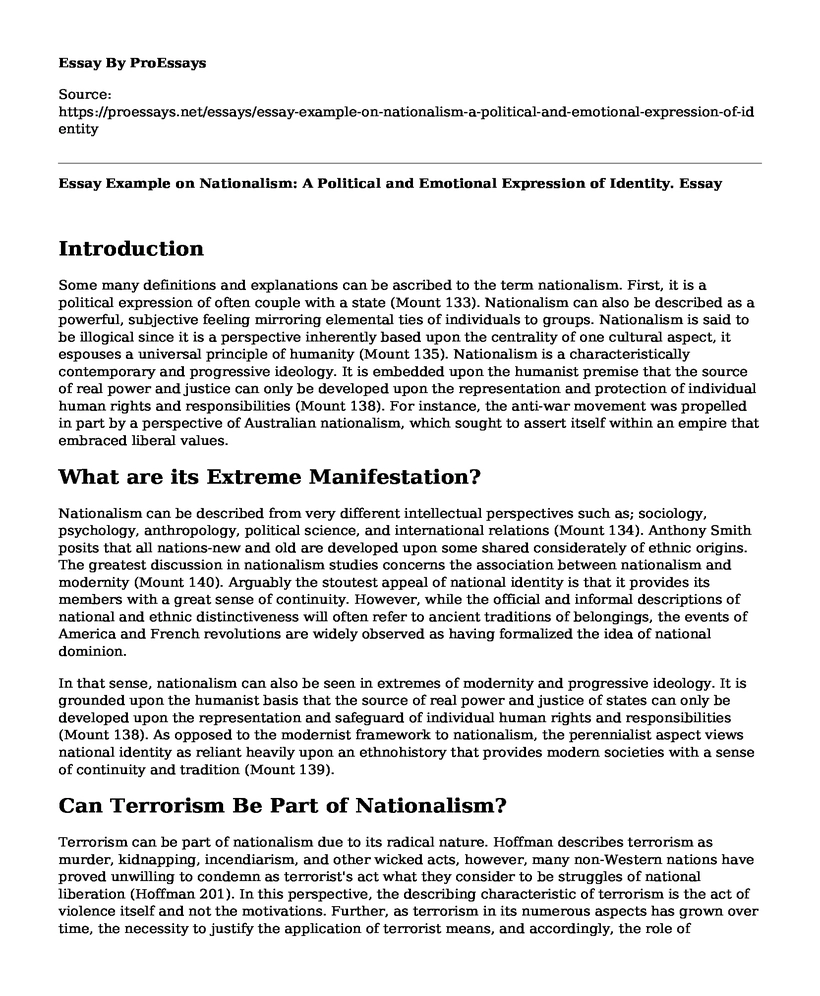Introduction
Some many definitions and explanations can be ascribed to the term nationalism. First, it is a political expression of often couple with a state (Mount 133). Nationalism can also be described as a powerful, subjective feeling mirroring elemental ties of individuals to groups. Nationalism is said to be illogical since it is a perspective inherently based upon the centrality of one cultural aspect, it espouses a universal principle of humanity (Mount 135). Nationalism is a characteristically contemporary and progressive ideology. It is embedded upon the humanist premise that the source of real power and justice can only be developed upon the representation and protection of individual human rights and responsibilities (Mount 138). For instance, the anti-war movement was propelled in part by a perspective of Australian nationalism, which sought to assert itself within an empire that embraced liberal values.
What are its Extreme Manifestation?
Nationalism can be described from very different intellectual perspectives such as; sociology, psychology, anthropology, political science, and international relations (Mount 134). Anthony Smith posits that all nations-new and old are developed upon some shared considerately of ethnic origins. The greatest discussion in nationalism studies concerns the association between nationalism and modernity (Mount 140). Arguably the stoutest appeal of national identity is that it provides its members with a great sense of continuity. However, while the official and informal descriptions of national and ethnic distinctiveness will often refer to ancient traditions of belongings, the events of America and French revolutions are widely observed as having formalized the idea of national dominion.
In that sense, nationalism can also be seen in extremes of modernity and progressive ideology. It is grounded upon the humanist basis that the source of real power and justice of states can only be developed upon the representation and safeguard of individual human rights and responsibilities (Mount 138). As opposed to the modernist framework to nationalism, the perennialist aspect views national identity as reliant heavily upon an ethnohistory that provides modern societies with a sense of continuity and tradition (Mount 139).
Can Terrorism Be Part of Nationalism?
Terrorism can be part of nationalism due to its radical nature. Hoffman describes terrorism as murder, kidnapping, incendiarism, and other wicked acts, however, many non-Western nations have proved unwilling to condemn as terrorist's act what they consider to be struggles of national liberation (Hoffman 201). In this perspective, the describing characteristic of terrorism is the act of violence itself and not the motivations. Further, as terrorism in its numerous aspects has grown over time, the necessity to justify the application of terrorist means, and accordingly, the role of nationalism as a provider of this justification has increased (Stepanova 43-44). In recent decades, the role of ideology for terrorist groups has also been developing due to their varying structural patterns, particularly the rapid spread of network features.
The ideologies that terrorist groups suggest to use as a basis for their terrorist activities are related to their socio-political, nationalist often employed in several combinations. However, regardless of a terrorist group's specific motivations and ideologies, their political-ideological beliefs tend to display some common elements (Neville-Wright 325-326). Global terrorism demonstrates only the most extreme manifestations of this wider social process, which also encompasses a wide variety of other social dimensions, very few of which resort to violent but all of which constitute a challenge to traditional forms of political behavior (Neville-Wright 327). The "war on terror" executed by the US and backed by many of its allies including Australia in the wake of the 9/11 attack defines an attempt to deal with terrorist problems ideally through traditional military ways (Neville-Wright 327).
Works Cited
Hoffman, Bruce. "What is Terrorism." file:///C:/Users/User/Downloads/Hoffman.%20What%20is%20Terrorism.pdf
Mount, Gavin. "Nationalism and War." An Introduction to International Relations (2007): file:///C:/Users/User/Downloads/Nations%20and%20Nationalism%20.pdf
Neville-Wright, David. "Global Terrorism." file:///C:/Users/User/Downloads/Global%20Terrorism.pdf
Stepanova, Ekaterina A. Terrorism in asymmetrical conflict: Ideological and structural aspects. Vol. 23. Oxford University Press, 2008. https://www.sipri.org/sites/default/files/files/RR/SIPRIRR23.pdf
Cite this page
Essay Example on Nationalism: A Political and Emotional Expression of Identity.. (2023, Jul 02). Retrieved from https://proessays.net/essays/essay-example-on-nationalism-a-political-and-emotional-expression-of-identity
If you are the original author of this essay and no longer wish to have it published on the ProEssays website, please click below to request its removal:
- Multicultural Philosophy Essay Example
- Essay Example on Cato's Arguments Against Republican Government
- Extremist Parties: Too Far or Part of Democracy? - Essay Sample
- Killing Nurses of the Third Reich: A Grim Reminder of Professional Ethics - Essay Sample
- Paper Sample on Deficit-Cutting Reforms: How ACA Helps Improve Healthcare Access
- Essay Sample on Brexit's Impact on the British Fashion Industry
- 2020 Campaign: Exploiting Partisan Divide to Create Division - Free Paper Sample







